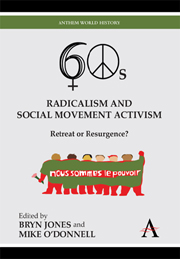Book contents
- Frontmatter
- Contents
- Introduction Sixties Radicalism: Creating Spaces and Leaving Legacies
- PART I Radical Movements Around the World
- PART II Theoretical & Cultural Significance
- 6 Nineteen Sixties Radicalism in the United States: Its Rise, Decline and Legacy
- 7 Students, Artists and the ICA: The Revolution Within
- 8 The Situationist Legacy: Revolution as Celebration
- 9 Habermas on Sixties Student Protests: Reflections on Collective Action and Communicative Potential
- PART III Social Movement Legacies
- Conclusion
- Notes on Contributors
- Author Index
- Subject Index
9 - Habermas on Sixties Student Protests: Reflections on Collective Action and Communicative Potential
from PART II - Theoretical & Cultural Significance
Published online by Cambridge University Press: 05 March 2012
- Frontmatter
- Contents
- Introduction Sixties Radicalism: Creating Spaces and Leaving Legacies
- PART I Radical Movements Around the World
- PART II Theoretical & Cultural Significance
- 6 Nineteen Sixties Radicalism in the United States: Its Rise, Decline and Legacy
- 7 Students, Artists and the ICA: The Revolution Within
- 8 The Situationist Legacy: Revolution as Celebration
- 9 Habermas on Sixties Student Protests: Reflections on Collective Action and Communicative Potential
- PART III Social Movement Legacies
- Conclusion
- Notes on Contributors
- Author Index
- Subject Index
Summary
Introduction
As one of the greatest sociologists and social philosophers of the latter part of the twentieth century, Jürgen Habermas's interactions with, and theorising of the problems confronted by the sixties student movement are of both major historical and contemporary significance. Other chapters in this book (McDonald chapter 2; O'Donnell chapter 6, Cranfield chapter 7) describe the movements for protest and greater freedom of expression amongst the student generations in Europe and North America. More specific to inter-generational conflict in Germany was the awakening of the baby boomer generation to the country's National Socialist past. The Wirtschaftwunder had provided the country with a great deal of new found confidence in the decades since the Second World War, but with the Adolf Eichmann trial of 1961 and the Auschwitz trials of 1963–65, as well as explorations of collective moral culpability emerging in theatre and literature, prosperity alone was an unsatisfactory basis for national confidence amongst a new generation who had reached the age of political consciousness. With their awakening, they developed a barely concealed anger with their elders’ misdeeds and considered their ‘no questions asked’ attitude not as a matter of discretion which allowed the resumption of everyday life, but as a complacent desire to forget, which could lead to the return of fascism. The sixties student movement became the highly politicised focus and catalyst for the radical expression of these sentiments.
- Type
- Chapter
- Information
- Sixties Radicalism and Social Movement ActivismRetreat or Resurgence?, pp. 149 - 166Publisher: Anthem PressPrint publication year: 2010



